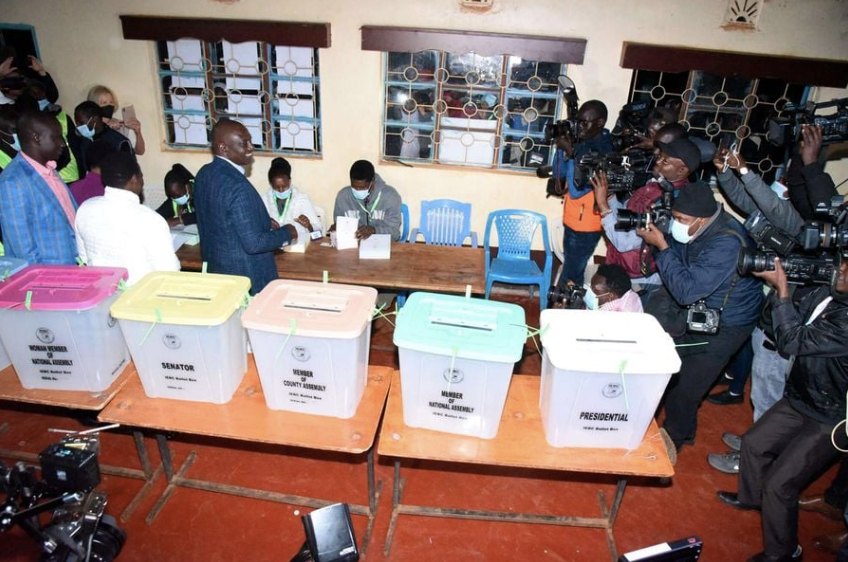Politics
General Election Must Be Held Next Year, Not 2027, Petitioners Tell Court
Their petition specifically argues that the Constitution requires presidential elections to be held within the fifth year following the last general election.

In a significant constitutional challenge that could reshape Kenya’s electoral calendar, three prominent petitioners have moved to court arguing that Kenya’s next general election should be held in August 2026, not in 2027 as widely anticipated.
Dr. Owiso Owiso, Khelef Khalifa, and Ashioya Biko contend that President William Ruto does not have to serve the full five-year term typically accorded to Kenya’s heads of state.
Their petition specifically argues that the Constitution requires presidential elections to be held within the fifth year following the last general election.
“We urge the court to declare that the fifth year from the last election begins on August 9, 2026,” the petitioners state in their court filing.
“Consequently, as guided by article 136(2)(a) of the constitution which require the next presidential election to be on the second Tuesday of the fifth year, which fifth year begins on August 9, 2026, Kenya’s next presidential election must be held on the second Tuesday of August 2026, being the fifth year.”
With the last election held on August 9, 2022, the petitioners argue the next poll should take place on August 11, 2026 — a full year earlier than the currently anticipated date of August 9, 2027.
Constitutional Timeline Interpretation
At the heart of their argument is a detailed interpretation of Article 136(2)(a) of the constitution, which states that a presidential election shall be held on the second Tuesday of August in the fifth year following the most recent presidential election.
The petitioners present a meticulous breakdown of the years following the recent presidential elections:
– Year one: August 9, 2022 to midnight August 9, 2023
– Year two: August 9, 2023 to midnight August 9, 2024
– Year three: August 9, 2024 to midnight August 9, 2025
– Year four: August 9, 2025 to midnight August 9, 2026
– Year five: August 9, 2026 to midnight August 9, 2027
According to this interpretation, the fifth year begins on August 9, 2026, making the appropriate election date the second Tuesday of August 2026.
Precedent from Previous Election Cycles
The petitioners cite former President Uhuru Kenyatta’s first term as precedent for their argument.
They note that Kenyatta was sworn in on April 9, 2013, but the subsequent election was held on August 8, 2017 — meaning he served “for a period of four years and five months” rather than a full five-year term.
“As consequence of the constitutional provisions cited… the then President had served for a period of four years and five months, counting from the date when he was sworn in as president, being April 9, 2013, and the presidential election held on August 8, 2017,” they state in their court pleadings.
IEBC Preparations and International Standards
The petitioners are also asking the court to issue an order directing the Independent Electoral and Boundaries Commission (IEBC) to proceed with preparations for the next presidential election on the second Tuesday of August 2026.
They accuse the IEBC of “failing to adhere to the ordained timelines for conducting the next general elections per the Constitution.”
The filing further argues that delaying the election beyond August 2026 would “unlawfully interfere with Kenyans’ right to participate freely in the government of their country” and would “frustrate the principles of democracy, rule of law, human rights and people’s rights” as outlined in various articles of the African Charter on Democracy.
This case represents yet another instance of Kenya’s electoral process facing judicial scrutiny, continuing a pattern established during previous election cycles where constitutional interpretation has played a decisive role in determining electoral timelines.
The courts will now have to determine whether the petitioners’ interpretation holds merit, potentially shortening President Ruto’s first term in office by a full year.
Kenya Insights allows guest blogging, if you want to be published on Kenya’s most authoritative and accurate blog, have an expose, news TIPS, story angles, human interest stories, drop us an email on [email protected] or via Telegram
-

 Investigations2 weeks ago
Investigations2 weeks agoHow Land Grabbing Cartels Have Captured Ardhi House
-

 Business2 weeks ago
Business2 weeks agoPanic As Payless Africa Freezes With Billions of Customers Cash After Costly Jambopay Blunder
-

 News2 weeks ago
News2 weeks agoSCANDAL: Cocoa Luxury Resort Manager Returns to Post After Alleged Sh28 Million Bribe Clears Sexual Harassment and Racism Claims
-

 Investigations1 week ago
Investigations1 week agoHow SportPesa Outfoxed Paul Ndung’u Of His Stakes With A Wrong Address Letter
-

 News3 days ago
News3 days agoTemporary Reprieve As Mohamed Jaffer Wins Mombasa Land Compensation Despite Losing LPG Monopoly and Bitter Fallout With Johos
-

 Investigations3 days ago
Investigations3 days agoFrom Daily Bribes to Billions Frozen: The Jambopay Empire Crumbles as CEO Danson Muchemi’s Scandal-Plagued Past Catches Up
-

 Investigations2 weeks ago
Investigations2 weeks agoHow Arrest of a Soldier’s Spouse Dragged KDF Into Alleged Theft of Meth Haul in Mombasa
-

 News1 week ago
News1 week agoRentokil Boss Fraser Branch in Highway Smash as DUI and Racism Claims Surface


















